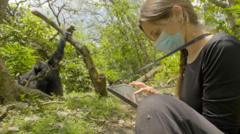Recent observations in Uganda's Budongo Forest have unveiled that wild chimpanzees employ a range of natural plants for self-treatment, comparable to a form of forest ‘first aid.’ Led by researchers from the University of Oxford, the study documents the unique behaviors exhibited by these primates as they use medicinal flora to address open wounds and other injuries.
The research builds upon prior findings that chimpanzees actively seek and consume specific plants for self-medication. The researchers collaborated with local teams to compile a detailed catalogue of how chimpanzees apply these plants in various ways, contributing to the evidence that primates possess innate knowledge regarding natural medicine.
Lead researcher Dr. Elodie Freymann emphasized that chimpanzees exhibit complex behaviors related to hygiene and injury treatment. The team observed instances where a young female chimp chewed on plant material before applying it to an injured area on her mother. Notably, chimpanzees were also reported to care for the wounds of unrelated individuals, a finding that highlights their capacity for empathy.
The researchers tapped into decades of observations, including anecdotal accounts collected at field stations since the 1990s. Logs noted behaviors such as applying leaves to injuries and helping others to rid themselves of snares. In one striking discovery, a chimpanzee was recorded using leaves to clean itself after defecation, exhibiting remarkably human-like hygiene practices.
Past studies identified several plants used by injured chimpanzees, showcasing their antibacterial properties. The ongoing research illustrates that chimpanzees are not alone in their use of plant-based medicines; similar behavior has been observed in orangutans, which also utilize natural resources for healing.
Understanding these chimpanzee practices may provide insights into new medicinal discoveries and underscore the intelligence of these primates. Dr. Freymann remarked on the wisdom chimps possess regarding their environment, contrasting it with human vulnerability in the wild. “If I were plopped down here in this forest with no food and no medicine, I doubt that I'd be able to survive very long,” she stated, highlighting the profound knowledge these animals have of their natural habitat.
The research builds upon prior findings that chimpanzees actively seek and consume specific plants for self-medication. The researchers collaborated with local teams to compile a detailed catalogue of how chimpanzees apply these plants in various ways, contributing to the evidence that primates possess innate knowledge regarding natural medicine.
Lead researcher Dr. Elodie Freymann emphasized that chimpanzees exhibit complex behaviors related to hygiene and injury treatment. The team observed instances where a young female chimp chewed on plant material before applying it to an injured area on her mother. Notably, chimpanzees were also reported to care for the wounds of unrelated individuals, a finding that highlights their capacity for empathy.
The researchers tapped into decades of observations, including anecdotal accounts collected at field stations since the 1990s. Logs noted behaviors such as applying leaves to injuries and helping others to rid themselves of snares. In one striking discovery, a chimpanzee was recorded using leaves to clean itself after defecation, exhibiting remarkably human-like hygiene practices.
Past studies identified several plants used by injured chimpanzees, showcasing their antibacterial properties. The ongoing research illustrates that chimpanzees are not alone in their use of plant-based medicines; similar behavior has been observed in orangutans, which also utilize natural resources for healing.
Understanding these chimpanzee practices may provide insights into new medicinal discoveries and underscore the intelligence of these primates. Dr. Freymann remarked on the wisdom chimps possess regarding their environment, contrasting it with human vulnerability in the wild. “If I were plopped down here in this forest with no food and no medicine, I doubt that I'd be able to survive very long,” she stated, highlighting the profound knowledge these animals have of their natural habitat.


















